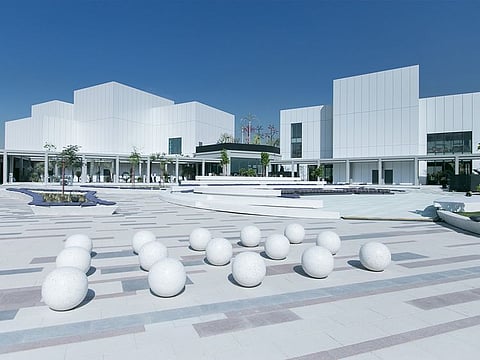Art Jameel commissions sustainability pavilion at Jameel Arts Centre in Dubai for COP28
The pavilion is designed by Adib Dada of architecture practice theOtherDada

Art Jameel, an organisation that supports artists and creative communities, announces the launch of Tarabot: Weaving A Living Forum. Imagined as a sustainable, immersive pavilion, Tarabot is designed by Beirut-based regenerative consultancy and architecture practice theOtherDada – founded by architect Adib Dada – and is the cornerstone of broader programming at Jameel Arts Centre.
Launching during COP28, Tarabot is set within the Jaddaf Waterfront Sculpture Park, with the architectural intent to host talks, presentations and community programmes throughout and after the global conference. Tarabot is commissioned by Art Jameel and is supported by Abdul Latif Jameel Company Ltd in Saudi Arabia.
Fady Jameel, Chairman and Founder of Art Jameel, commented: “Tarabot is an excellent way to illustrate our commitment to innovation in addressing timely global issues, serving as a hub for collaboration across the fields of art, architecture and technology. The pavilion stands as a living testament to cutting-edge and dynamic solutions that underpin our ethos across our endeavours.”
Antonia Carver, Director of Art Jameel, said: “Tarabot is a radical space that pioneers exciting new research and architectural materials and also actively engages the community in thinking-in-public about a shared sustainable future. It illustrates in such a dynamic way Art Jameel’s long-term approach to foregrounding the role of the arts in addressing the climate crisis – from international collaborations such as the World Weather Network, to major grants programmes that fund artists to produce thematic work and institutions to decarbonise, such as the current regional Anhar: Culture and Climate Platform, in collaboration with the British Council, and UAE-based Research and Practice Platform, with Dubai Culture, through to our role convening a regional network of arts leaders and ecologists, with whom we are collectively publishing (in time for COP) bilingual sustainability charters and toolkits for the Middle East.”
Tarabot: Weaving a Living Forum acts as an interspecies ecotone – an area where two biological communities meet and integrate – hosting a shared space between humans and other species and organisms, and creating synergies between the natural world and manmade environments. Made of modular and nested cone components crafted from locally sourced, sustainable materials including clay, mycelium, date palm waste and upcycled fabric. The pavilion is a call for the revival of urban spaces, through a focus on the hyperlocal and the creation of circular ecological support systems within new and existing material structures. Its design incorporates four pillars that speak to its concept, construction and de-installation: Soil, Water, Plants, and Energy. After de-installation, the modular constituents of Tarabot: Weaving a Living Forum will be repurposed for domestic planting on land with the structure taking on new life as underwater habitat for coral and fish, linking life on land to life underwater.
Adib Dada, architect and founder of theOtherDada, said: “Tarabot is our first project that meaningfully bridges our work of building habitats for humans with building habitats for other organisms. By re-integrating our place within nature, we are able to offer a shared forum for humans and other organisms to thrive in the city. Tarabot – which means ‘to weave together’, offers a shared space for humans and other organisms to come together as interdependent equals, sharing food, water and habitat.”
Also featured within Tarabot is a series of artworks created by Dubai-based, multidisciplinary artist Solimar Miller in response to the impact of urbanisation on the environment, Miller’s artwork captures plant and animal species native to the UAE, drawing attention to the importance of preserving indigenous biodiversity and encouraging broader conversations around climate change. Tarabot hosts a series of planting workshops during the UAE’s annual sustainability festival Down to Earth (November 25), leading up to the launch.
Tarabot: Weaving a Living Forum is commissioned by Art Jameel and supported by Abdul Latif Jameel Company Ltd. – Saudi Arabia. This collaboration is part of Art Jameel’s longstanding commitment to addressing the climate crisis and advocating for sustainability in the arts.
Sign up for the Daily Briefing
Get the latest news and updates straight to your inbox



